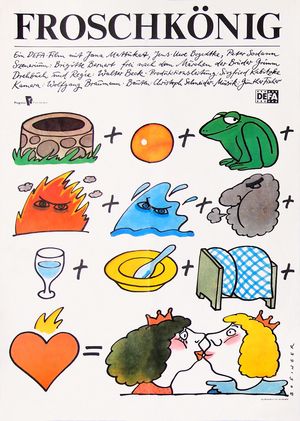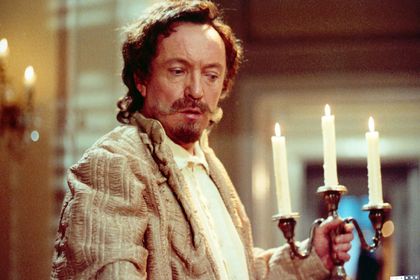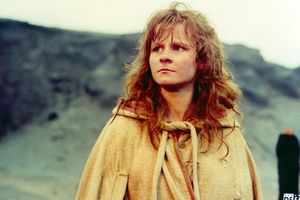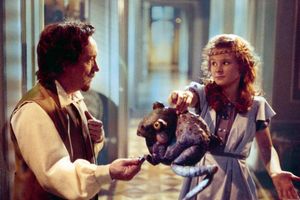Froschkönig
Director: Walter Beck, 67 Min., Color, Feature Film
Deutsche Demokratische Republik (DDR)
DEFA-Studio für Spielfilme, 1987
- Film/Video Format
- 35 mm
- Length in m
- 1829
- English Title
- The Frog Prince
- Premiere Date
- Release Date (for Cinema)
- Literary Source
- Gebrüder Grimm: "Der Froschkönig", Märchen

(Dir.: Walter Beck, 1987) Graphic Design: Manfred Bofinger
Short Summary (English)
While playing in the palatial gardens, Princess Henriette, the king's youngest daughter; drops her favourite plaything, a golden ball, into a cool spring. A frog offers to get her toy from the water. But on one condition: from now on, she is to share food, drink and bed with him. She does not hesitate to make this promise. But when the frog wants to join her in bed, she is filled with disgust and throws him against a wall. He is turned into a handsome prince and she falls in love with him right away. But as she has broken her promise, he is only partly freed from his spell and has to leave her. The princess sets out to find him; she has to weather perils and pass trials. She finally reaches the castle of the frog-king who, meanwhile, has become lonesome, embittered and emotionally cold.
Disguised as Master Henry, she succeeds in slipping into the castle. She helps the cooper; the cook and the chamberlains. And so, quite cunningly, she can still fulfil her promise and have the cast on the prince lifted.
Source: Progress Film-Verleih

(Dir.: Walter Beck, 1987) Photography: Dieter Jaeger

(Dir.: Walter Beck, 1987) Photography: Dieter Jaeger
Film Crew
- Director
- Script
- Scenario
-
- Brigitte Bernert
- Camera
-
- Wolfgang Braumann
- Film Editing
-
- Rita Hiller
- Cast
-
- Jana Mattukat (Henriette)
- Jens-Uwe Bogadtke (Froschkönig)
- Peter Sodann (König)
- Franziska Glöss-Ebermann (Florentine)
- Susanne Lüning (Geraldine)
- Thomas Wolff (Askold)
- Pedro Hebenstreit (Barnabas)
- Dieter Wien (Carbinian)
- Günter Schubert (Dagobert)
- Gunter Friedrich (Reiter)
- Karl Sturm (Reiter)
- Gunnar Helm (Reiter)
- Jürgen Hölzel (Reiter)
- Gerd Blahuschek (Stimme Feuer)
- Janina Hartwig (Stimme Wasser)
- Carl Martin Spengler (Stimme Wind)
- Assistant Director
-
- Dagmar Kleist
- Assistant Camera
-
- Dietrich Pohl
- Dieter Jaeger
- Production Design
-
- Christoph Schneider
- Script Editing
-
- Gerd Gericke
- Music
-
- Günther Fischer
- Sound
-
- Werner Dibowski
- Helga Kadenbach (Tonmischung)
- Costume Design
-
- Dorit Gründel
- Make-Up
-
- Klaus Becker
- Waltraud Becker
- Props
-
- Werner Giesler
- Production Management
-
- Siegfried Kabitzke
- Unit Production Management
-
- Holger Bohm
- Egon Schlarmann
- Design
-
- Bernd A. Chmura (Froschentwurf)
- Horst Misch (Frosch: Plastisches Modell)
- Lutz Hoffmann (Choreografie)
- Marco Lenk (Choreografie)
- Frank Lenk (Pyrotechnik)
- Animation
-
- Erich Günther
- Heiko Ebert
- Frank Wittstock
- Wolfgang Chevallier
- DEFA Photography
-
- Dieter Jaeger
Short Summary (German)
Eine Prinzessin lässt beim Spiel eine goldene Kugel in den Brunnen fallen, und ein Frosch gibt sie ihr zurück - unter der Bedingung, dass sie fortan mit ihm Speise, Trank und Bett teilt. Das Versprechen ist schnell gegeben, doch als der Frosch in ihr Bett will, wirft sie ihn empört an die Wand. Er verwandelt sich in einen schönen Prinzen, muss sie aber verlassen, weil sie ihr Versprechen gebrochen hat. Die Prinzessin macht sich auf die Suche nach ihm, übersteht vielfältige Gefahren und gerät zum Schloss des Froschkönigs. Als Junge verkleidet, gelingt es ihr hineinzukommen. Als Gehilfe bei Küfer, Koch und Kammerherrn kann sie ihr Versprechen doch noch erfüllen und den Prinzen erlösen.
(Quelle: Das zweite Leben der Filmstadt Babelsberg. DEFA-Spielfilme 1946-1992)
Short Summary (Other Languages)
Un giorno, giocando, una principessa perde una palla d'oro in un pozzo. Gliela restituisce un ranocchio, chiedendole che, da quel momento in poi, possa mangiare, bere e dormire con lei. La promessa è presto data, ma quando il ranocchio cerca di intrufolarsi nel suo letto, la principessa lo lancia contro il muro disgustata. Cadendo a terra, il ranocchio si trasforma in un bellissimo principe, costretto ad abbandonare la ragazza, perchè questa non ha mantenuto la promessa. La principessa inizia a cercarlo e dopo mille traversie raggiunge il suo castello. Travestita da ragazzo, lavora per il cantiniere, il cuoco e il ciambellano, mantiene la promessa e libera il principe. (Italienisch)



